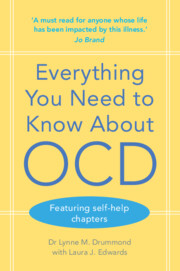Book contents
- Everything You Need to Know about OCD
- Reviews
- Everything You Need to Know about OCD
- Copyright page
- Contents
- Preface
- Acknowledgements
- 1 What Is OCD and Is It Really a Problem?
- 2 Who Gets OCD and How Would Anyone Know if They Had It?
- 3 Types and Presentation of OCD
- 4 Drug Treatment
- 5 Exposure and Response Prevention for OCD
- 6 Children and Adolescents with OCD
- 7 Old Treatments, Modern Developments, New Research, and Potential Treatments for the Future
- 8 Other Conditions Which Appear Similar to OCD
- 9 What Can Family and Carers Do to Help a Person with OCD?
- 10 What Can You Do to Help Cope with Your OCD?
- 11 General Principles of Treatment
- 12 How to Better Manage Your Symptoms Before and During Treatment
- 13 Overcoming Fears of Contamination
- 14 Fear of Harm to Self or Others Due to Failure to Act
- 15 Fear of Harm to Self or Others Due to Your Own Actions (or Thoughts)
- 16 Overcoming ‘Taboo’ Obsessive Thoughts
- 17 Loss of Something (Objects or Part of ‘Self’)
- 18 Overcoming Obsessive-Compulsive Slowness, Perfectionism and Symmetry
- 19 Overcoming Obsessive Ruminations (Sometimes Known as ‘Pure O’)
- 20 When the Treatment Doesn’t Go According to Plan or Even If It Does, What to Do Next
- Appendix
- Glossary
- Resources
- References
- Index
10 - What Can You Do to Help Cope with Your OCD?
Published online by Cambridge University Press: 27 May 2022
- Everything You Need to Know about OCD
- Reviews
- Everything You Need to Know about OCD
- Copyright page
- Contents
- Preface
- Acknowledgements
- 1 What Is OCD and Is It Really a Problem?
- 2 Who Gets OCD and How Would Anyone Know if They Had It?
- 3 Types and Presentation of OCD
- 4 Drug Treatment
- 5 Exposure and Response Prevention for OCD
- 6 Children and Adolescents with OCD
- 7 Old Treatments, Modern Developments, New Research, and Potential Treatments for the Future
- 8 Other Conditions Which Appear Similar to OCD
- 9 What Can Family and Carers Do to Help a Person with OCD?
- 10 What Can You Do to Help Cope with Your OCD?
- 11 General Principles of Treatment
- 12 How to Better Manage Your Symptoms Before and During Treatment
- 13 Overcoming Fears of Contamination
- 14 Fear of Harm to Self or Others Due to Failure to Act
- 15 Fear of Harm to Self or Others Due to Your Own Actions (or Thoughts)
- 16 Overcoming ‘Taboo’ Obsessive Thoughts
- 17 Loss of Something (Objects or Part of ‘Self’)
- 18 Overcoming Obsessive-Compulsive Slowness, Perfectionism and Symmetry
- 19 Overcoming Obsessive Ruminations (Sometimes Known as ‘Pure O’)
- 20 When the Treatment Doesn’t Go According to Plan or Even If It Does, What to Do Next
- Appendix
- Glossary
- Resources
- References
- Index
Summary
These final chapters will examine how someone with OCD can help themselves and seek treatment. Advice will be given on setting up a self-treatment grade exposure with response prevention programme (ERP), as well as resources and organisations which can be helpful in achieving this. The advice will be given as a step-by-step guide for developing a personal ERP programme to tackle OCD.
It will also examine what to do if an individual is finding difficulty accessing help and will give useful contacts and organisations as well as written material.
- Type
- Chapter
- Information
- Everything You Need to Know About OCD , pp. 168 - 173Publisher: Cambridge University PressPrint publication year: 2022

